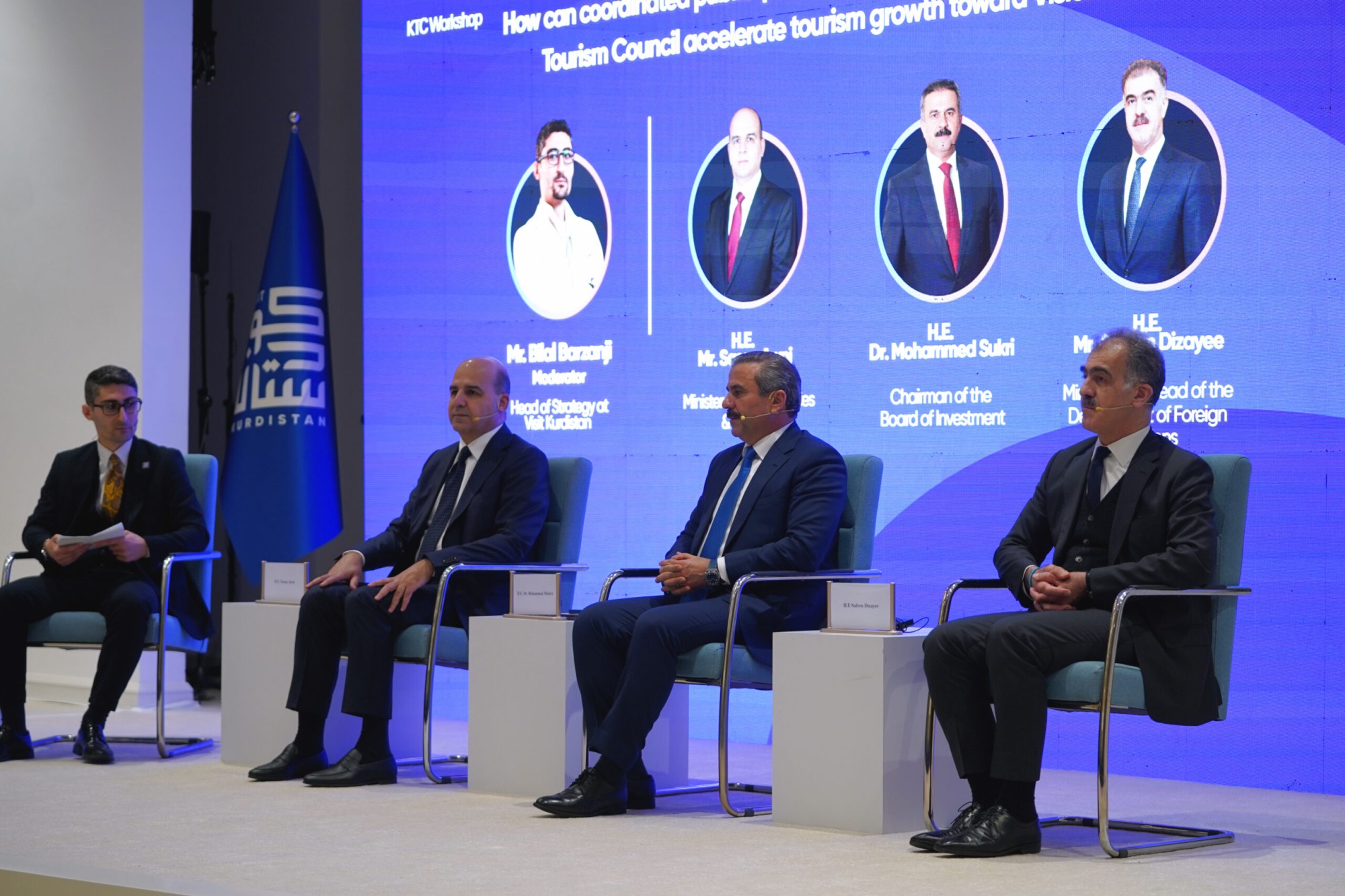Safeen Dizayee, Head of the Kurdistan Regional Government (KRG)’s Department of Foreign Relations, in a post on X on March 3, 2024, announced the end of the KRG delegation’s visit to Washington, D.C., led by KRG Prime Minister Masrour Barzani.
Concluded an important and successful visit led by PM @masrourbarzani to Washington.
— Safeen Dizayee (@SafeenDizayee) March 2, 2024
Thank you to our American allies and friends for the warm welcome and hospitality. Looking forward to further strengthen our ties and deepen our friendship in the future. pic.twitter.com/zvac6R59xy
“Thank you to our American allies and friends for the warm welcome and hospitality. Looking forward to further strengthen our ties and deepen our friendship in the future,” Dizayee posted on X.
“Our relationship with the United States remains strong,” Prime Minister Barzani wrote in a post on X on March 2, 2024.
On February 24, 2024, on an official invitation by the Biden administration Prime Minister Barzani traveled to Washington to meet with top U.S. officials and members of Congress. Highlights of the trip included a meeting with Secretary of State Antony J. Blinken on February 26.
Highlights of Prime Minister Masrour Barzani's official visit to the US: From diplomatic meetings to economic discussions. pic.twitter.com/b0XdVY04xN
— Kurdistan Chronicle (@KurdChronicle) March 2, 2024
“Our support for a resilient KRG is integral to our 360-degree approach to Iraq. And so the opportunity today to reaffirm this support, reaffirm this partnership, and the work that we’re doing together I think is important and timely,” Secretary Blinken said during the meeting.
“Of course, we are great friends and partners, and we are very proud to say that we are American allies. We have been through some very difficult times,” Prime Minister Barzani added. “And we are very thankful and we express our gratitude for the support that the U.S. has always given to our people.”
Kurds face new challenges in Iraq
However, he added that the Kurds now face “some new challenges in the region.”
For instance, politicized court rulings of the Federal Supreme Court of Iraq have increasingly undermined the Kurdistan Region’s autonomy and institutions.
Furthermore, on March 23, 2023, Turkey stopped the flow of Kurdish oil exports after a France-based arbitration court ruled in favor of Iraq against Turkey, depriving the Kurdistan Region of its oil income. So far, oil exports have not resumed despite talks between Baghdad, Ankara, and Erbil.
Productive talks with @POTUS Advisor Amos Hochstein today on ways to accelerate the resumption of oil exports from the Kurdistan Region.
— Masrour Barzani (@masrourbarzani) March 1, 2024
The lack of exports has hurt everyone — costing billions in lost revenues. It makes no sense.
We will double down efforts. pic.twitter.com/3EOeymXiwA
“The lack of exports has hurt everyone, costing billions in lost revenue. It makes no sense,” Prime Minister Barzani said after meeting Senior Advisor for Energy and Investment Amos Hochstein on March 1, 2024.
Iran has also used the war in Gaza as an excuse to step up attacks on U.S. troops in Syria and Iraq, including the Kurdistan Region, with the aim to push the United States out of Iraq.
Unlike the federal government in Baghdad, the KRG has advocated for U.S. troops to stay. On January 29, Prime Minister Barzani strongly condemned an attack on U.S. forces in Jordan that killed three U.S. servicemen.
Furthermore, an Iranian ballistic missile attack killed four civilians in Erbil on January 15, including prominent businessman Peshraw Dizayee.
United States confirms support for a strong Kurdistan Region
The U.S. National Security Advisor Jake Sullivan also met Prime Minister Barzani in the White House on February 29, 2024, who condemned attacks by Iran and Iranian-backed proxy groups against the Kurdistan Region.
Additionally, he confirmed U.S. support for a strong and economically viable Kurdistan Region as outlined in the Iraqi Constitution.
In a meeting with White House Coordinator for the Middle East and North Africa Brett McGurk, on February 29, Prime Minister Barzani urged the United States to back the KRG and federal government “on a lasting deal that respects the Iraqi Constitution.”
During our exchange with @brett_mcgurk, I urged the United States to back the KRG and federal government on a lasting deal that respects the Iraqi Constitution. pic.twitter.com/FtJ4xVFxiD
— Masrour Barzani (@masrourbarzani) March 1, 2024
KRG visit comes ahead of Iraqi Prime Minister Sudani’s trip to Washington
The KRG delegation visit led by Prime Minister Barzani comes ahead of a visit by Iraqi Prime Minister Mohammed Shia’ Al Sudani, expected to take place after Ramadan, which ends around April 9. This has reportedly raised eyebrows among some Shi’a politicians in Iraq.
At the meeting, Iraqi Prime Minister Sudani is expected to discuss the security partnership between the United States and Iraq.
“Prime Minister Barzani coming before Iraqi Prime Minister Sudani may have been an effort to assuage concern in Congress that the U.S. was ignoring and abusing the friendship of the Iraqi Kurds,” Michael Knights, an Iraq expert at the Washington Institute, told Kurdistan Chronicle.
“After the latest Iranian ballistic missile strikes in Erbil, the likelihood of a visit increased. This visit by Prime Minister Barzani was a follow-up to the meeting with Secretary Blinken in Davos in January, and also included visits with members of the National Security Council, the Pentagon, the intelligence community, and Congress.”
In a statement on January 5, Iraqi Prime Minister Sudani said Baghdad is preparing for arrangements “to end the presence of the international coalition forces in Iraq permanently.” On January 27, the U.S.-Iraq Higher Military Commission held its first meeting.
Importance of Kurdish participation in U.S.-Iraq bilateral talks
U.S. State Department spokesperson Matthew Miller on February 27 stated that Secretary Blinken also discussed the importance of Kurdish participation in the U.S.-Iraq Higher Military Commission.
Furthermore, Acting Under Secretary of Defense for Policy Sasha Baker, who met Prime Minister Barzani on February 29, expressed thanks for the peshmerga’s participation in the 2023 Joint Security Cooperation Dialogue in Washington, as well as representation in current working level meetings for the U.S.-Iraq Higher Military Commission in Baghdad.
Fruitful exchange today with DoD Under Secretary Sasha Baker.
— Masrour Barzani (@masrourbarzani) February 29, 2024
We have common concerns: terrorism, ISIS and shared aspirations for regional stability.
We also exchanged notes to secure more meaningful support for the Peshmerga. pic.twitter.com/zzD1Fy1Qik
Retired Colonel Rich Outzen, a nonresident senior fellow at the Atlantic Council in Turkey, who served as the senior advisor to the Office of the Special Representative for Syria under the Trump administration, told Kurdistan Chronicle that it is “very significant that the United States stands by the role of the Kurdistan Region and its security forces as key components of a stable Iraqi state.”
“Efforts by some forces in the country and the region to marginalize or undermine the Kurdistan Region and the peshmerga are ill-advised, and contrary to the interests of the United States, as well as those of Iraq. Pressing for Kurdish participation is one way to underline that.”
“Unfortunately, the Biden administration has not pushed back strongly enough against efforts to weaken the Kurdistan Region – especially via the needless and senseless continued closure of the Iraq-Turkey Pipeline. I suspect they will continue to ask politely without using the full pressure available,” he added.
Frustration over U.S. policy
Mohammed A. Salih, a senior fellow at the U.S.-based Foreign Policy Research Institute, told Kurdistan Chronicle that “U.S. officials’ calls for the inclusion of the KRG in Iraq-U.S. military negotiations are important to provide the KRG with some weight and the voice that it has been seeking in such matters.”
Nevertheless, he noted a strong frustration among Kurdish officials with the overall U.S. policy in Kurdistan. “While the KRG has made itself a target for deadly and destabilizing attacks by Iran and pro-Iranian militias due to Kurdish support for continued U.S. presence in Iraq, the United States has not shown the same degree of risk-taking and willingness to assist the Kurdistan Region.”
“The U.S. has major leverage over the Iraqi government and ruling groups in Baghdad, particularly when it comes to the economy and Iraq’s reliance on U.S. military technology. It can convince Baghdad to ease up its pressure on the KRG. But Washington has not been willing to do so. “
He added that the KRG needs the United States to help it overcome the pressures from Baghdad, which has attempted to collapse the Kurdistan Region’s economy and create major domestic discontent. “The United States needs Kurdish support to be able to legitimize its presence in Iraq and – in a worst-case scenario – possibly move all its troops in Iraq to the Kurdistan Region, if it decides to do so.”
United Kurdish voice important
Yerevan Saeed, Director of Global Kurdish Initiative for Peace at American University, added that the visit of Prime Minister Barzani to Washington has “significantly improved the strained relationship between Erbil and Washington, which has long been marked by low trust and a feeling of abandonment by the Kurds.”
Additionally, he said it is important that the United States underlined the participation of KRG officials in the Iraq-U.S. military negotiations as crucial “to counterbalance the political forces hostile to U.S. interests in Iraq. The active participation of a united Kurdish voice is important for both Erbil and Washington.”
“During meetings with Secretary Blinken, strong and unprecedented language was used to classify KRG-U.S. ties based on shared values, interests, and a history of sacrifice. Washington acknowledges the Kurdistan Region as a reliable security partner that has consistently provided stability crucial to advancing U.S. security and geopolitical interests in the region,” he added.
Furthermore, he added that the United States prioritizes its interests and views Kurdish disunity as potentially hindering those interests, necessitating unity among Kurdish parties.
“The Kurds must not take U.S. security commitments for granted, as circumstances could change, especially with an upcoming presidential election in the United States. Therefore, it is crucial for Kurds to act swiftly and effectively to maximize this limited window of opportunity,” he added.
However, he said the main question remains whether “the U.S. is going to use its leverage to push Baghdad to allow the Kurdistan Region to resume oil exports. This was a key demand of the Kurdish delegation.”

